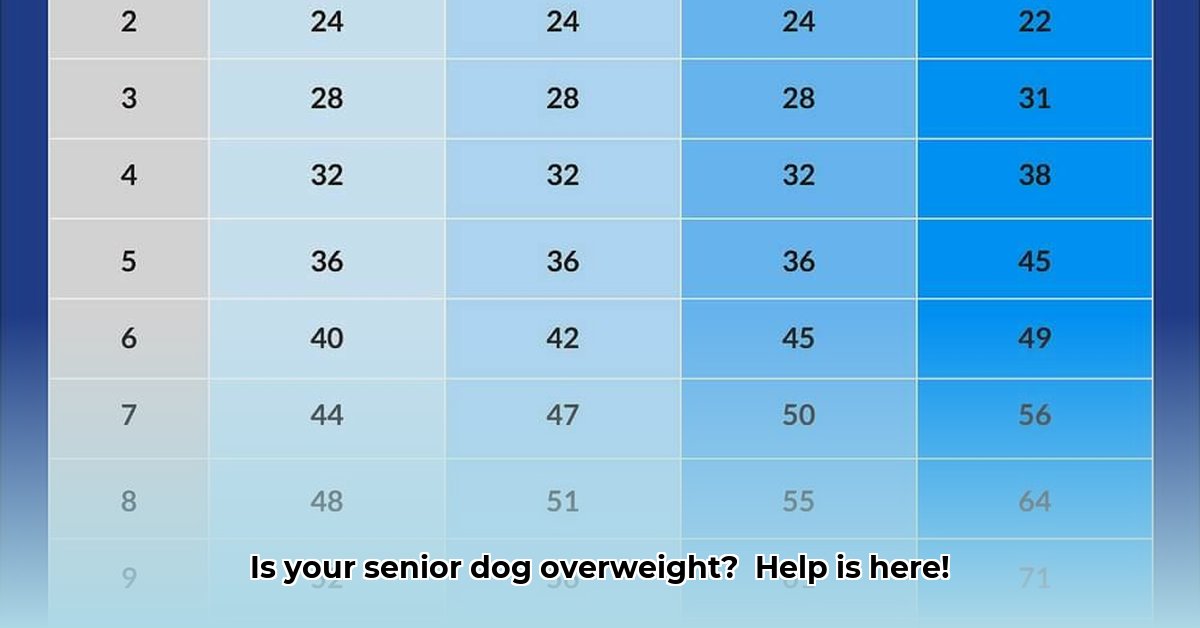
Old Dog Weight Loss: Understanding the Urgent Need for Action
Seeing your senior dog lose weight can be alarming. While some weight fluctuation is normal with age, significant or sudden weight loss (over 10% in a few months) requires immediate veterinary attention. This isn't just about aesthetics; it's a crucial indicator of potential underlying health issues. Ignoring it could have serious consequences. This guide provides actionable steps to help you understand and address this critical concern.
Identifying the Causes of Weight Loss in Senior Dogs
Weight loss in older dogs isn't always straightforward. Several factors can contribute, ranging from natural aging processes to serious medical conditions. Let's explore the key possibilities:
- Age-Related Changes: Decreased metabolism and appetite are common in senior dogs, but these changes should be gradual, not drastic.
- Dental Issues: Tooth decay or gum disease can make eating painful, hindering proper nutrition.
- Digestive Problems: Conditions like inflammatory bowel disease (IBD) disrupt nutrient absorption, leading to weight loss.
- Underlying Diseases: Serious illnesses, such as diabetes, kidney disease, cancer, or hyperthyroidism, frequently manifest as significant weight loss.
- Medication Side Effects: Some medications can affect appetite and digestion, impacting your dog's weight.
It’s crucial to understand that a simple dietary change might not suffice if an underlying health condition is the culprit. A thorough veterinary examination is paramount to establish the root cause.
A Step-by-Step Guide to Addressing Your Senior Dog's Weight Loss
Here’s a structured approach to navigate this concern. Remember, this is a general guideline; always consult your veterinarian for personalized advice.
1. Monitor Weight Changes Closely: Use a pet scale to weigh your dog weekly. Detailed weight tracking (including dates and weights) provides valuable information for your vet. Note any behavioral changes (lethargy, decreased playtime) alongside weight fluctuations.
2. Schedule an Immediate Veterinary Visit: Don't delay this crucial step. Your vet will perform a comprehensive examination to rule out underlying medical conditions. Blood tests, urine analysis, and fecal exams may be necessary. Early detection is vital for effective treatment.
3. Follow Your Vet's Recommendations Precisely: Your veterinarian will provide a tailored treatment plan based on the diagnosis. This might include medication, dietary adjustments, or other interventions. Adherence to this plan is crucial for your dog's recovery.
4. Dietary Adjustments: Fueling Your Senior Dog's Recovery: Your vet might recommend a high-quality, senior-specific dog food, higher in calories and protein, to support weight gain. They may also suggest supplementing the diet with easily digestible protein sources. Never make significant dietary changes without veterinary guidance.
5. Maintain Regular Veterinary Checkups: Ongoing monitoring is essential. Regular checkups allow your vet to track progress, adjust the treatment plan as needed, and detect new problems early.
Nutritional Considerations for Senior Weight Gain
Proper nutrition plays a vital role in helping your senior dog regain weight. Here's what to focus on:
Calorie Density: Senior dogs need more calories per bite to maintain weight. Your vet will determine the appropriate calorie intake for your dog's size, age, and activity level.
Protein Intake: High-quality protein is essential for sustaining muscle mass and overall health. Easily digestible protein sources are frequently recommended for senior dogs.
Limited Carbohydrates (Vet-Guided): In some cases, limiting carbohydrates might improve digestion, but this depends on your dog's specific condition and should be determined by your vet.
Small, Frequent Meals: Smaller, more frequent feedings can improve digestion and increase overall calorie intake.
Addressing Risks Associated with Dietary Changes
Modifying your dog's diet carries potential risks. The following table highlights common interventions, their benefits, risks, and mitigation strategies:
| Intervention | Benefits | Risks | Mitigation |
|---|---|---|---|
| High-calorie diet | Weight gain, improved energy levels | Obesity, pancreatic issues | Gradual introduction, regular veterinary monitoring |
| High-protein diet | Muscle mass maintenance, improved health | Digestive upset, dehydration | Veterinary guidance, monitoring hydration levels |
| Dietary Supplements | Enhanced digestion, nutrient absorption | Allergic reactions, drug interactions | Vet consultation before use, careful monitoring |
Remember: Always consult your veterinarian before making any significant changes to your dog’s nutrition.
Preventing Future Weight Loss in Senior Dogs
Proactive measures can help prevent future weight loss. This includes:
- Regular weight monitoring: Weekly weigh-ins provide an early warning system.
- Attentive behavioral observation: Note any changes in appetite, energy levels, or activity.
- Scheduled veterinary checkups: Annual (or more frequent) checkups are crucial for senior dogs.
- Balanced senior-specific diet: Provide a nutritionally complete diet that meets your dog’s specific needs.
- Prompt attention to health concerns: Address any health issues promptly to prevent weight loss.
This guide provides crucial information. Remember, partnering with your veterinarian is paramount in ensuring your senior dog's health and well-being. Early detection and proactive management are vital for a positive outcome.